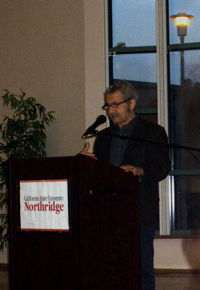new audio: dr. michael parenti at csun

Noted progressive author, lecturer, and professor, Dr. Michael Parenti, delivered a sharp, insightful talk on empire, perception, and representation recently, at Cal State Northridge.
One of his key points was to explore how the dominant paradigm functions, especially how it propagates and maintains empire and, more importantly, imperialism. He noted that even the Rightwing has now begun to openly define the United States as an empire—although of course, they do so proudly, invoking the "responsibility" to spread freedom, prosperity, and democracy. In addition, they decontextualize empire by erasing all reference to the underlying violence and ideological force of Imperialism, and instead employ what Parenti identified as a standard line about "accidental" empire. As he notes in the lecture, those who support empire like to decontextualize it through the construction of a fictitious scenario in which the imperial power just happened to accidentally stumble into its position of power...somehow. Parenti uses the example of the British, who liked to paint themselves this way, as if they'd backed into being an empire without any thought or planning involved.
This process of decontextualization was another key point that Parenti hit on—how so much of the dominant paradigm maintenance of empire occurs through a decontextualized representation that strips our perception of the current situation of its historical (and, I would add, geospatial) context.
I found this last point particularly relevant for Chicanas/os in Los Angeles over the past few weeks as we continue to untangle some of the intricately woven historical and geospatial decontextualizations-masquerading-as-contextualizations of the Phantom Sightings exhibition at LACMA.
Just as Parenti makes the point that imperialism pretends to a kind of accidental happening upon its position of power after the fact, we might do well to consider how we ourselves contribute to such an erasure and decontextualization as we leap into the contextless void of the "post"- and perceive our own post-MFA/Ph.D. positions "after" the (dead? finished? over?) (singular, monolithic) Chicano Movement, as "accidental."
To complicate this issue a bit, though, I did have a question for Parenti regarding a recent article in the latest issue of Anarchy: A Journal of Desire Armed (I didn't ask because he seemed really tired and ready to leave). In the article, the author questions the viability of employing the rhetoric of "anti-imperialism," given the history of those who have used this rhetoric toward totalitarian and fascist ends. Part of the article's argument also is that the situation has changed so much, and so quickly, that the term "imperialism," and its related rhetoric, are too outdated to address what is happening now. They are only used by those dinosaur Leftists who still cling to the 60s, and who have failed to accurately assess the current situation because they are locked into old-fashioned perceptions and understandings. Parenti points out that he was talking about empire and imperialism in relation to the United States long before most others began to do the same; once they did, it became common, to the point, as noted above, that both Leftists and the Rightwing have become comfortable calling it empire (though, again, not necessarily "imperialist").
I thought this was an interesting point—if the mainstream is openly using the terminology of empire (but not imperialism), then Parenti is arguing that we need to create context through an explicit identification of the imperialist ideology, violence, and function underlying empire. But if, as the Anarchy article argues, the terminology of anti-imperialism is outdated, then is Parenti's solution not enough?
I guess my question, re-worded, is this—and it applies to the Anarchy article's interrogation of "anti-imperialist" rhetoric, Parenti's discussion, and to the Phantom Sightings exhibition as well:
How do we accurately name the present without erasing the past, and without repeating the same mistakes of the past? Why does doing the former so often necessarily result in the latter two scenarios in the first place? In what ways might our (mis)uses of language mask a process of de-contextualization through a surface appearance of providing context?
........................................................................................................
To listen to the lecture and Q&A, click below (right/ctrl-click to download):
AUDIO: MICHAEL PARENTI—LECTURE
[1:03'17; 58 mb]
AUDIO: MICHAEL PARENTI—Q&A
[22'01; 20 mb]
........................................................................................................
Links to more information:
Michael Parenti Political Archive
Michael Parenti on Znet�
<< Home